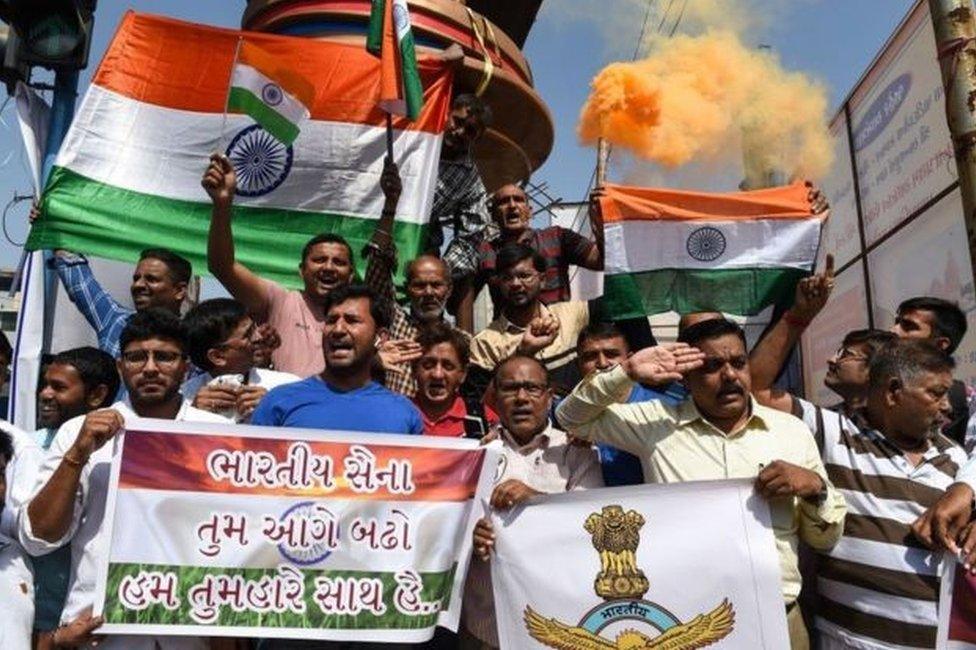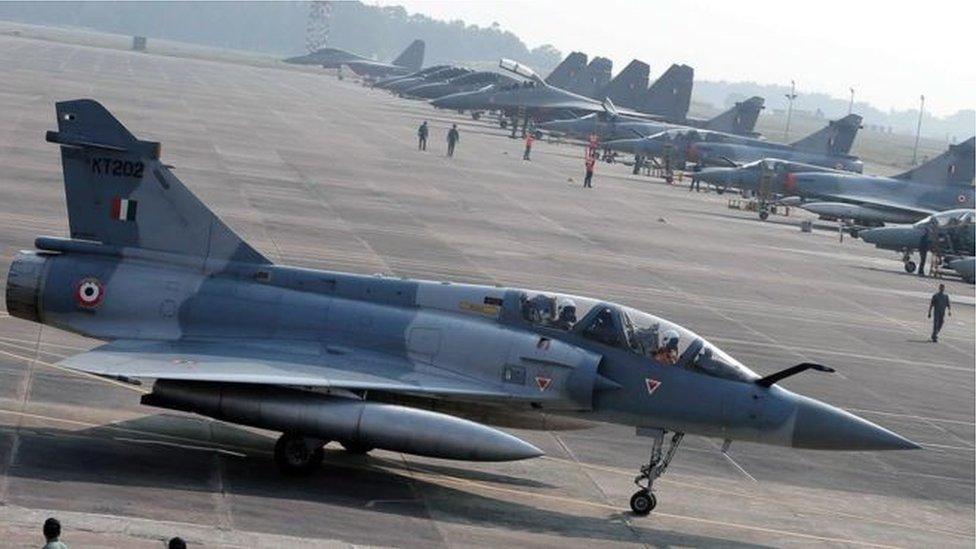India and Pakistan in 'uncharted waters'
- Published

Indians celebrated on hearing news of the strikes
"We are in uncharted waters," says Husain Haqqani, alluding to the latest round of heightened hostilities between India and Pakistan.
The former Pakistani ambassador to the US served as an adviser to three Pakistani prime ministers. He is the author, most recently, of Reimagining Pakistan: Transforming a Dysfunctional Nuclear State.
After Tuesday's air strikes by India targeting militants in Pakistani territory, Pakistan promised to respond "at the time and place of its choosing".
Less than 24 hours later, Pakistan said it had launched air strikes across the Line of Control (LoC) dividing Pakistan and Indian-controlled Kashmir. It also claimed to have shot down two Indian Air Force jets in its airspace in Kashmir and arrested two pilots on the ground. India has shut down parts of its airspace in the north of the country.
Many believe that the Pakistani strike could be seen as a tit-for-tat - it, like India, feels the need to placate its domestic constituency. But the challenge now is to contain the escalation of hostilities before things get completely out of control.
For one, Tuesday's air strikes by India were completely unexpected. They are the first launched across the LoC - the de facto border that divides Kashmir - since a war between the two countries in 1971.
"Pakistani military establishment had banked on India's reluctance to escalate in using asymmetrical warfare (terrorism) under the nuclear umbrella," Professor Haqqani told me.

Indian warplanes crossed the Line of Control and struck targets in Pakistan on Tuesday
"India feels it has found a soft spot where it can strike - whether on ground using special forces as in 2016 or using air strikes as they have done now - without crossing that threshold."
Professor Haqqani says Pakistan "does not want war with India but its military faces a credibility challenge".
"It does not want to shut all jihadi groups. But the jihadis' presence is a constant source of problems. In 2011 the Americans entered Pakistani air space to get Osama Bin Laden. Now the Indians entered Pakistani air space, dropped bombs and returned home without resistance.
"How will the Pakistani military explain itself to a public that accepts a huge military budget on the grounds of its military's ability to defend Pakistani sovereignty?"

Read more from Soutik Biswas

Daniel Markey, a senior professor at Johns Hopkins University in the US, says the problem is that "most military solutions to the Pakistan problem at India's disposal are far, far more costly to India than they are likely to bring about the desired end state".
"Everyone in Delhi knows this. The goal now is to introduce a higher level of punishment for each instance of Pakistani aggression. It's not a bad strategy, as long as each move is calculated carefully and there aren't too many mistakes.
"For instance, in this episode, some reports suggest that Indian aircraft had intended to fire from the Indian side of the LoC, but wind forced them into Pakistani territory. If true, that's the sort of unintended element of escalation that introduces new risk at each step."
What risk of nuclear conflict?
Daniel Markey believes the escalation is more serious than one anticipated - "moving the conflict into Pakistan 'proper' was intended to be a muscular and different move, one that most recent Indian prime ministers would have been reluctant to take".
So is there a real threat of a nuclear conflict?
"Sadly, there is always a real threat of nuclear escalation between India and Pakistan, but we are several steps from that at this moment. Aside from accidental or unauthorised use (both unlikely), we would need to see a significant conventional escalation in this conflict before nuclear use looks likely," says Dr Markey.
"But these escalations are possible, especially if Pakistan's next step were to raise the stakes by hitting Indian civilian targets."
That is highly unlikely - but the question for the countries now is can they find a way of stepping back from their most dangerous flashpoint in decades?
Follow Soutik at @soutikBBC, external